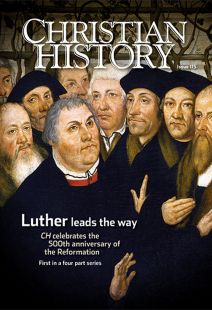Editor’s note: Luther leads the way
WHEN I WAS MUCH YOUNGER and in graduate school at Duke University, I decided to drop a class. (This does happen, even in graduate school.) I had to decide on a class to take in its place and was going over the course schedule with my mother on the phone. (This also happens sometimes, even in graduate school.) I mentioned that Duke offered a class on Luther. “Oh, you should take that one,” she said. “That’s where we all started.” By we she meant Protestant we.
I did take the class, entering with the picture many of us have in our heads: a quiet October Wednesday morning in 1517, the young Augustinian friar and theology professor creeping to the door of All Saints’ Church in Wittenberg and, with one nail, striking a death blow to medieval Catholicism. By the end of the course, I learned—not for the last time—that the history of the Reformation, like much else about church history, is more complex than I had previously expected.
This issue of Christian History is the first of four leading up to the celebration in 2017 of the Reformation’s 500th anniversary. This series also serves as a companion to CHI’s new DVD This Changed Everything, which celebrates the fruits of the Reformation while exploring difficult questions about the cost of division (see ad, page 2).
The man behind the movement
We begin our journey with the story of Luther. Actually, we start before Luther: a number of people throughout the later Middle Ages began to feel that the church had somehow gotten off course and that it needed reform. But Luther’s movement caught fire and quickly resulted in something no previous reform effort had: large-scale division of the Western church.
We’re pleased to be able to reprint classic articles from Christian History’s two previous issues on Luther (34 and 39) and from issue 49 on everyday faith in the Middle Ages, all updated with new images. But we’re also taking a fresh look at who Luther was, who helped him and who opposed him, what he changed and what he didn’t.
In 2016 the second and third issues in this series will focus on people who took reformation into the political realm, and about what happened when all the changing allegiances of the movement’s early years began to harden and solidify into separate “confessions.” Finally, in 2017 we’ll finish with an issue on the Catholic Reformation (sometimes called the “Counter-Reformation”), which grew out of the Catholic response to these new Protestant movements.
When I finished that class on Luther all those years ago, I was able to reaffirm a bigger definition of “we,” one that includes all Christians. We all started together, 2,000 years ago at the foot of the cross and at the door of the empty tomb. Luther knew that, but we sometimes forget, and divisions that began 500 years ago run deep. No matter what part of the church you come from, I ask you to remember our common beginnings and our common faith as we take this four-part journey. In so doing, you’ll be better prepared to realize our bonds, both past and present, with all of our brothers and sisters in Christ. CH
Christian History’s 2015–2017 four-part Reformation series is available as a four-pack. This set includes issue #115 Luther Leads the Way; issue #118 The People’s Reformation; issue #120 Calvin, Councils, and Confessions; and issue#122 The Catholic Reformation. Get your set today. These also make good gifts.
By Jennifer Woodruff Tait
[Christian History originally published this article in Christian History Issue #115 in 2015]
Jennifer Woodruff Tait is Managing editor of Christian HistoryNext articles
The man who painted the Reformation
Lucas Cranach gave us indelible images of the Reformation
Paul Thigpen and the editorsAfter the revolution
The beginning of the Reformation was not the end of Luther’s troubles
Mark U. Edwards Jr.What did Luther know and when did he know it?
When did Luther discover justification by faith?
Edwin Woodruff TaitLuther Led the Way, Did You Know?
Luther loved to play the lute, once went on strike from his congregation, and hated to collect the rent
the editors and others




